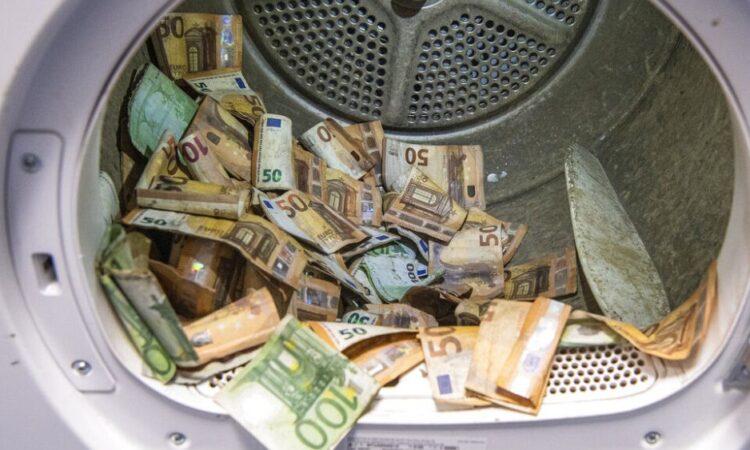
Officials hope revamped laws will draw a line under a series of dirty money scandals
EU negotiators are closing in on a deal on landmark new anti-money laundering laws – potentially bringing in bans on large cash payments and paid-for citizenship.
The bloc is keen to draw a line under a series of dirty money scandals – but its plans aren’t without their controversy.
New laws could improve the EU’s tarnished reputation for fighting illicit finance.
Two EU members – Croatia and Bulgaria – currently sit on an ignoble “grey list” of suspect money laundering jurisdictions compiled by international standard-setter the Financial Action Task Force (FATF), where they languish alongside Haiti, Syria and Yemen.
The region has been hit by a spate of financial-sector scandals, including Danske Bank processing hundreds of billions in dirty Russian funds through its Tallinn branch, and the collapse of Pilatus Bank in Malta – a country which also spent a year on the FATF list.
The talks are given extra urgency by the need to stop Russia evading war-linked sanctions, and after a number of years when the bloc was plagued by terrorist violence aided by shady finance.
For the first time ever, EU anti-money laundering rules are to be set out in a regulation directly affecting all 27 members, with the hope of making them both easier to comply with, and more effective at tackling cross-border flows.
Early next week (11 and 12 December), representatives of the European Parliament, the EU’s Council which groups member governments, and the Commission will thrash out their planned revamp, in closed-door meetings known as a trilogue.
Yet time is running out for a deal to be finalised under the current EU Council chairmanship, which Spain is due to cede to Belgium at the end of December.
Cash and culture
Negotiators appear to have already agreed to extend the law to artwork dealers, implying they’d have to carry out bank-style identity checks on their customers.
That’s because the illicit artefacts trade can be used to fund crime and terrorism – with groups such as ISIS profiting from archaeological remains looted in Iraq and Syria.
An EU document prepared for an earlier, 14 November trilogue meeting, seen by Euronews, suggests the new rules could hit a broad swathe of intermediaries dealing in high-value cultural goods, including archaeological objects, manuscripts and musical instruments.
Legislators are also poised to ban the use of cash for large transactions – preventing people from buying valuable goods like real estate with a wad of notes.
But there’s been disagreement about whether to set the threshold at €10,000 or lower, while some lawmakers are concerned that mandating digital payments raises concerns over privacy, access and cybersecurity.
Disagreement
MEPs have said their plans will help stop billions of euros of dirty money flowing through the EU economy.
The measures “mark the beginning of the end for criminals, terrorists, oligarchs, art ‘enthusiasts’ and crooked football agents,” lawmaker Damien Carême, who shepherded the regulation through the European Parliament’s Civil Liberties Committee, said in a March statement.
Yet many elements of the legislative deal still aren’t squared – including Carême’s plan to apply money-laundering checks to football clubs.
A planned new EU anti-money laundering agency will supervise dirty-money controls at around 40 major banks, but the talks next week are unlikely to resolve which of nine candidate cities will get to host it, a source briefed on the talks told Euronews.
MEPs also need to convince the Council to ban citizenship-by-investment, which grants passports to anyone with the right level of funds.
Lawmakers are “right that this sector needs to be regulated,” Transparency International’s Roland Papp told Euronews, saying that so-called golden visas are “prone to money laundering and corruption.”
He’s supported by FATF, which in a November report highlighted a network of “criminal, negligent, or complicit” real estate agents and wealth managers that often back the schemes.
Ownership
But Papp, who’s Senior Policy Officer for Illicit Financial Flows at the pressure group, said tackling dirty money also requires shining a light on the true ownership of companies, trusts and other exotic legal structures.
That was thrown into disarray by what Papp calls a “disastrous” ruling last year from the EU’s highest court.
In a shock November 2022 decision, judges said that publishing information on corporate ownership could expose the super-wealthy to the risk of fraud or kidnapping.
Negotiators now need to figure out how to make that data available to those with a legitimate interest in tracing dirty money, such as journalists and civil society pressure groups.
That would likely happen as part of parallel talks on a new Anti-Money Laundering Directive – a separate legal instrument that offers more flexibility to national governments – but Papp is convinced of the benefits.
“It isn’t just about fighting money laundering,” Papp said, adding that beneficial ownership data can also help fight against tax fraud, organised crime and illegal logging. “There are many, many fields where this information is part of the puzzle.”






